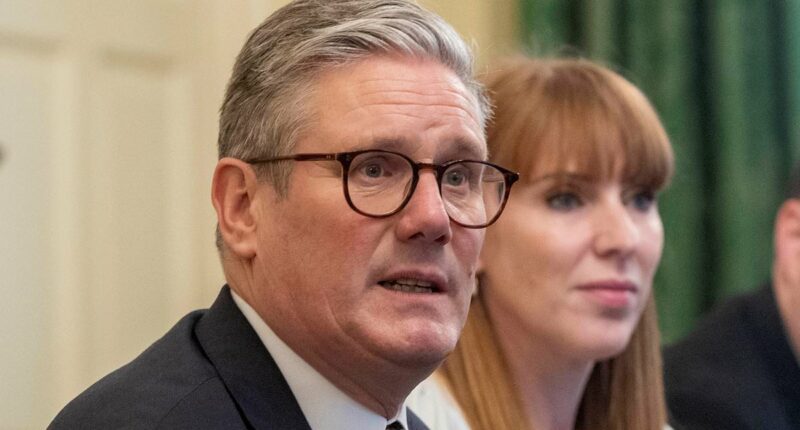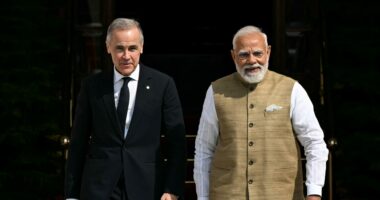Share this @internewscast.com
Here’s something truly shocking. Ten days after the Hamas terrorists murdered and raped 1,200 Jews in Israel, a radical preacher by the name of Shujauddin Sheikh stood up to speak to a gathering at the Karachi Press Club in Pakistan.
In his address – later broadcast via an Islamic radio station to British Muslims in the northern town of Bury – this rabble-rouser described Jews as ‘the biggest enemies of humanity’ and shared a number of anti-Semitic tropes.
The station was fined by regulator Ofcom for this incendiary slur.
So, did the Muslim charity behind the station apologise? Of course not. Instead, it launched a vicious assault on Ofcom, claiming the regulator supports a ‘Zionist agenda’ and is – a key word – ‘Islamophobic’.
Why am I highlighting the incident? Because it offers a chilling glimpse into the dystopian future of British life if a sinister new plan backed by Keir Starmer and the Labour Government is allowed to take effect.
Ever since returning to power one year ago, Labour MPs, many of whom depend on Muslim votes, have been demanding a hard-edged definition of ‘Islamophobia’.
And now, at the instruction of Deputy Prime Minister Angela Rayner, a special committee – below the radar and away from public scrutiny – has been pushing ahead with a plot to impose one upon the British people and our institutions.
We got an idea of what Rayner and the rest have in mind a few weeks ago when, on the very same day that Labour was finally forced to make a commitment to holding a national inquiry into the mass rape of white working-class girls, their secretive working group quietly launched a ‘call for evidence’ about creating the new definition.

Thousands of people attended a Stand Up To Islamophobia march in London in June

At the instruction of Deputy Prime Minister Angela Rayner, a special committee – below the radar and away from public scrutiny – has been pushing ahead with a plot to impose a hard-edged definition of ‘Islamophobia’ upon the British people and our institutions
Was this ‘call’ to the British people in general, or critics of the idea of ‘Islamophobia’?
Of course not. Although anyone can respond to the consultation, Labour kept things quiet and has reportedly called on hand-picked loyalists and Muslim organisations to feed into the work.
The new definition, Labour claims, ‘will help ministers and other relevant bodies understand what constitutes unacceptable treatment and prejudice against Muslim communities’.
The consultation ended yesterday. We do not actually know who was consulted.
We do, however, know that Sir Keir and his party seem hell-bent on strengthening the code of silence that too often applies whenever Muslim practices are questioned.
And we do know who is on their committee, including its chairman, Tory grandee and arch-Remainer Dominic Grieve. And that gives us a very good – and very troubling – idea of what they will conclude.
To fully make sense of this, we must go back to 2018, when a definition of ‘Islamophobia’ was first put forward by an All-Party Parliamentary Group of MPs and backed by the Labour Party, then in opposition.
That, too, involved the likes of Grieve and fellow liberal-minded Remainer Anna Soubry.
Their report concluded that ‘Islamophobia’ was ‘rooted in racism and is a type of racism that targets expressions of Muslimness or perceived Muslimness’. What on earth does this mean, you might ask? What counts as targeting ‘expressions of Muslimness or perceived Muslimness’?
Anything that’s perceived to be ‘Islamophobic’ by Muslim campaign groups and their allies on the radical Left, that’s what.
Astonishingly, this earlier definition specifically mentioned expressions of concern about ‘Muslim rape gangs’ as an example of ‘Islamophobia’.
It described discussion of Muslim grooming gangs – which we now know as a matter of plain fact are disproportionately more likely to involve men of Pakistani origin – as a ‘subtle form of anti-Muslim racism’ and ‘a modern-day iteration’ of ‘age-old stereotypes and tropes about Islam and Muslims’.
Imagine if this pernicious definition – backed by Labour then and which informs its thinking now – had been accepted by public institutions at the time.
Throughout the entire rape-gang scandal, people would have had to walk on eggshells. It’s likely they would have felt obliged to remain silent lest they be branded Islamophobic for daring to expose the evil paedophiles.
None of this should come as a surprise because for years now, Left-wing activists, Labour MPs and others have sought to use accusations of ‘Islamophobia’ to shut down any discussion about rape gangs, first-cousin marriage, Sharia law or cultural practices within some Muslim communities.
Are we to be banned from challenging and debating how Islam views things such as women’s rights, gay rights, and freedom of expression?
Will criticism of Islam’s position on these issues also effectively be outlawed by this new dogmatism?
That original definition had plenty more to say, meanwhile.
Discussing ‘conspiracies about Muslim entryism in politics, government, or other societal institutions’ might also be considered ‘Islamophobic’, for example.
Where would that leave us on the rise of sectarian Muslim MPs in Westminster who appear to spend more time focusing on what is happening in Gaza than wanting to fix problems here in Britain?
Or what if somebody wants to voice concern about the fact that, as reliable surveys show, some 40 per cent of British Muslims would support a ‘Muslim-only’ political party, while one-third would back the imposition of a parallel Sharia legal system in Britain?
Will this too be branded ‘Islamophobia’? Labour’s attempt to produce and then enshrine a definition of ‘Islamophobia’ will inevitably have a chilling effect on British society.
The fact of the matter is that pressure to protect Islam and Islamism from criticism – whether through this plan to outlaw ‘Islamophobia’, the misuse of existing laws like the Public Order Act, or simply threats of violence – is already corroding our freedom of expression.
This is why I support the recent suggestion by the think-tank Policy Exchange that all government activity on ‘Islamophobia’ be paused until the forthcoming inquiry into the rape gangs has concluded – at which point we will be able to see, fully, what damage these efforts to police our language have really done.
Put it this way: if the rape-gang scandal taught us anything as a country, it is that we must be able to debate everything freely and openly, no matter how uncomfortable it makes others.
I, for one, do not want to live in a country where dogmatic accusations of ‘Islamophobia’ are used to prevent people from the pursuit of truth and justice.
- MATT GOODWIN is a senior visiting fellow at the University of Buckingham and writes a regular column at mattgoodwin.org








